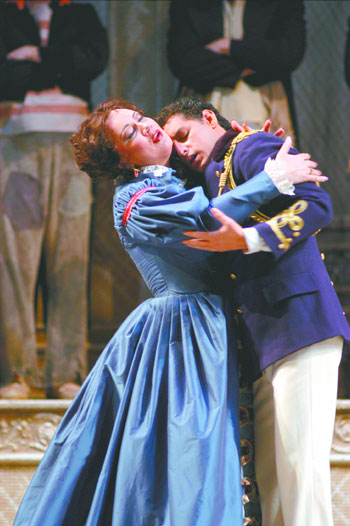The Met revives a much-appreciated tradition of bel canto pureness
Writing about the Metropolitan Opera in recent years seems all too often a matter of finding synonyms for “not bad,” without even a really horrifying night of filth to kick the old Schadenfreude into gear. So it’s a particular pleasure to have the opportunity to go all out in praising the company’s revival of Rossini’s “L’italiana in Algeri” (“The Italian Girl in Algiers”), a production for which the strongest superlatives sound inadequate.
The rarest of operatic delights is the surprise triumph, and that’s what mezzo-soprano Olga Borodina accomplished in the leading role of Isabella. The singer’s smoldering performances of such femmes fatales as Carmen, Dalila, and Amneris are of course familiar to New York audiences, but this part showcases her previously unrevealed abilities in both comedy and coloratura. Cast as a take-charge gal who single-handedly rescues herself and a shipload of prisoners from pirates, Borodina is in fact a very funny lady. She has the self-confidence to let her sparkling expressive eyes do all the heavy lifting in the comedy, never indulging in exaggerated mugging.
It is a luxury to hear so full and gorgeous a voice in this role. In the many brilliant passages, Borodina sings with impressive accuracy and rhythmic verve, if hardly with the superhuman articulation of, say, Marilyn Horne or Cecilia Bartoli. But for an entire long evening, Borodina’s tone unfailingly glows with a glamorous Burgundy color, and she can finesse the sound down into a silken thread for the lyrical “Per lui che adoro” in the second act––pure legato seductiveness.
At the first notes of this aria I was a little concerned that the mezzo had miscalculated and chosen to sing too softly, but I soon realized she knew what she was doing: the notoriously bronchial Met audience hushed their coughing for the duration and sat rapt.
Less surprising but certainly no less absolute was the success of tenor Juan Diego Flórez as Isabella’s boyfriend Lindoro. This young artist is clearly the pre-eminent light tenor of our generation, offering an unrivaled combination of tonal sweetness and technical polish. The voice, though not large, is absolutely even over a range of two octaves, with a particular brilliance around high C. Unlike so many “Rossini tenors,” this artist never sacrifices musicality to bravura exhibitionism; every interpolation and embellishment sounds both organic to the score and spontaneously personal.
What’s more, Flórez is a natural talent for the stage, relaxed and charming, with a slightly wistful quality even in knockabout comedy; the audience clearly cherishes him. No review of this singer would be complete without a mention that he is quite adorable; at 31, he looks just about ready to audition for a boy band.
Two superstars in excellent form; who could ask for anything more, right? Well, this production offers as well the veteran basso Ferruccio Furlanetto as the blustering potentate Mustafà. The high tessitura of this role highlights the sheer booming hugeness of his voice. His gifts as an operatic comedian are familiar, but what made this performance really special was the touch of sympathetic humanity Furlanetto brings to what is usually a two-dimensional figure. With this artist at the center of the action, farce ripens into comedy of an almost Falstaffian richness.
Even the throwaway role of Haly was cast luxuriously this time around, showcasing the honeyed voice and star stage presence of the gifted young baritone Mariusz Kwiecien. He might even have been promoted to the part of Taddeo, since Earle Partiarco was solid but unremarkable in this role.
Who ever would have guessed that James Levine would evolve into so savvy a Rossini conductor? From the first phrases of the overture, the orchestra played with a delicacy and bounce utterly unlike the mechanical, hard “Cenerentola” he led a few seasons ago. Best of all, the maestro modulated his lively tempi to his singers’ abilities, driving forward for Flórez, but allowing the fuller-voiced Borodina a bit more breathing room.
If only some of the Met’s “new” productions could look as crisp and stylish as this 30-year-old staging by the late Jean-Pierre Ponnelle! In an ideal world, one might ask for a clever though self-effacing stage director to adapt a few bits of risqué comic business to suit better the specific talents of the cast, but that may just be greedy when everything else in this “Italiana” so closely approaches perfection.
James Jorden is the editor of parterre box, the queer opera zine (parterre.com).



































